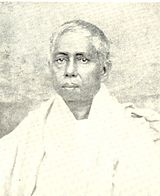Umesh Chandra Dutta
| Umesh Chandra Dutta | |
|---|---|
 |
|
| Born | 16 December 1840 Majilpur |
| Died | 19 June 1907 (aged 66) Kolkata |
| Occupation | Social reformer |
Umesh Chandra Dutta (also spelt as Umeshchandra Datta or Umes Chandra Dutta) (1840-1907) was one of the pioneer Brahmos who firmly established the Brahmo Samaj at Harinavi in the face of severe opposition from local people. He was one of the founders of Sadharan Brahmo Samaj and contributed substantially to the cause of education, particularly women’s education. He was designated a ‘Sadhu’ for his pious life.
Son of Haramohan Dutta, he belonged to Majilpur village, adjacent to Joynagar village. Both the villages were on the fringe of the Sundarbans in 24 Parganas district. He passed entrance in 1859 from the London Missionary Society Institution at Bhawanipur. Although he joined Medical College, poverty forced him out of medical education. From 1862 he took to teaching in different schools and graduated in 1867 as a private student.
He shifted to Bharat Ashram established by Keshub Chunder Sen after his marriage according to Brahmo rites in 1867.
When he was young, Shib Krishna Dutta of his village carried the flame of the Brahmo Samaj into the village. He used to read the Tattwabodhini Patrika regularly. Under his influence young folk including Umesh Chandra Dutta were inclined towards the Brahmo Samaj. As the young men had attempted to follow Brahmo religious rites, they faced substantial opposition and torture but withstood the opposition bravely and stuck to their beliefs. He came in contact with Debendranath Tagore and Keshub Chunder Sen and joined the Brahmo Samaj in 1859.
When he joined as a teacher of a school at nearby Harinavi he got together some people of the locality and the surrounding areas and started a Brahmo Samaj there in 1866. They built a small room with thatched roof on a piece of land in the compound of a Brahmo devotee and made arrangements for regular upasana. While matters thus progressed, Sivanath Sastri, who also belonged to Majilpur, formally joined the Brahmo Samaj and removed his sacred thread.
Forsaking ones sacred thread was something unheard of in those regions. While his father turned him out of the house, it created an enormous public outburst. Parents of young Brahmins who used to come to the samaj for upasanas started torturing their wards, in order to prevent them from taking part in upasanas. There was an environment of fear amongst those sympathetic to the cause of the samaj. The people of the locality gathered and concluded that Sivanath Sastri had forsaken his sacred thread on his advice, and, therefore, no Brahmo could continue to be a teacher in the school. They put up a petition to that effect to the secretary of the school Dwarakanath Vidyabhusan, maternal uncle of Sivanath Sastri. He was in many ways sympathetic to the Brahmo cause but had not joined the Brahmo Samaj.
...
Wikipedia
